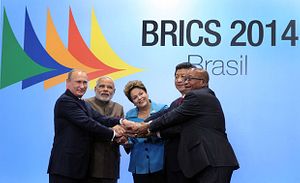The BRICS grouping opened its new bank, the New Development Bank (NDB), at a ceremony in Shanghai on Tuesday. The ceremony was attended by China’s finance minister, Lou Jiwei, NDB president K.V. Kamath, and Shanghai Mayor Yang Xiong. The bank is expected to start operations in late 2015 or early 2016, according to Xinhua.
The creation of the NDB was announced at the BRICS summit in Brazil in July 2014. The bank was – and is – envisioned as an answer to the current international financial system, which is dominated by the West. Xinhua’s article on the NDB explained that the BRICS countries “have been marginalized in the global financial landscape,” especially at the World Bank and International Monetary Fund (IMF). The NDB is clearly intended as a solution to that problem. As the bank’s website puts it, the NDB is “operated by the BRICS states (Brazil, Russia, India, China and South Africa) as an alternative to the existing U.S.-
Still, despite the NDB being depicted as an alternative to existing institutions, officials have been adamant that the bank is designed to “supplement” rather than supplant the current system. Finance Minister Lou told a seminar that “the NDB will supplement the existing international financial system in a healthy way and explore innovations in governance models,” according to Times of India. Bank president Kamath insisted that “our objective is not to challenge the existing system as it is but to improve and complement the system in our own way.”
Jim Yong Kim, president of the World Bank, was similarly upbeat about cooperation in a congratulatory statement on the bank’s opening. “We are committed to working closely with the New Development Bank and other multilateral institutions, offering to share our knowledge and to co-finance infrastructure projects,” Kim said in a statement. “These types of partnerships will be essential to reach our common goals to end extreme poverty by 2030, boost shared prosperity, and to reduce inequalities.”
The BRICS bank, like much of the BRICS interactions, is devoted to the idea of equality. “In the New Development Bank each participant country will be assigned one vote, and none of the countries will have veto power,” the NDB website explains. The initial capital of $50 billion in the bank will also be “equally shared” among the five founding nations, Xinhua reported, meaning each country will have equal voting rights as well.
As a further sign of the equality of the BRICS members, the leadership positions are spread out among the member countries: the bank president, K.V. Kamath, is Indian, and the presidency will rotate among representatives of the various countries. The first chair of the board of governors will be Russian and the first chair of the directors will be Brazilian. The first (and as yet only) regional office for the bank is in Johannesburg, South Africa.
However, having the BRICS bank headquarters in Shanghai has caused some concern that China would wield an outsized influence. “The fact that the bank will be based in China … gives China more power in choosing which projects get funded and which do not,” James Rickards, a senior managing director at Tangent Capital, told CNBC when the bank was announced in July 2014. Skeptics view the NDB as a de facto extension of what Joshua Cooper Ramo called the “Beijing Consensus,” whereby China uses loans and aid to developing countries to ensure access to natural resources. China’s sheer economic size – its GDP is larger than that of the other four BRICS combined – makes the idea of a perfectly equal BRICS grouping unlikely.
Because of this tendency to see the NDB as a Chinese project, the bank has been overshadowed recently by the Asian Infrastructure Investment Bank, another multilateral financial institution championed by China. Both share similar missions – funding infrastructure investments in developing countries – but the AIIB, with 57 founding members, is larger, and counts developed countries (including close U.S. allies like Germany, the U.K., and South Korea) among its members. Accordingly, the AIIB has attracted more media attention in recent months.
However, the NDB remains important as a reminder that China is not alone in seeking alternatives to the Western financial system. It’s also a rare practical achievement for the BRICS grouping. Analysts often criticize BRICS as a group in name only, where the member nations have nothing in common except their status as large, developing nations. The NDB stands as a clear rebuttal to that argument — if the bank can avoid being overshadowed by China’s separate pet project.

































